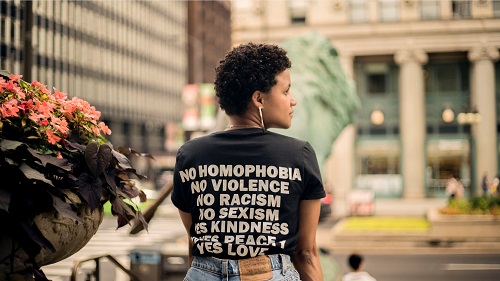Can financial technology help reduce inequality?
Mobile money. Digital microfinance. Investment apps. Instant credit. As fintech products proliferate, there is growing enthusiasm among companies, governments and non-governmental organisation (NGOs) about the potential for fintech to improve financial equality.
The idea is that if we all had better access to financial tools, then we could increase our financial knowledge, make better decisions, and grow our personal wealth. The belief is that if everyone had access to better tools— small and medium-sized enterprises (SMEs) to capital, poor people to microfinance, women to investments, and youth to financial literacy — then these individuals would be able to grow their wealth and inequality would decrease.
These days, whether you are a farmer in a low-income country who needs insurance, or a woman wanting to get into investment for the first time, there’s an app that’s tailored to your needs. But can fintech really reduce inequality? Can it lift people out of poverty and increase financial literacy among young people, or can it simply reduce stress for all of us by making financial management easier?

Can it lift people out of poverty and increase financial literacy among young people?
The answer is unclear. Today most of the financial tools on the market are very new and researchers have not had time to assess their effects. Moreover, mobile phones give people access to far more financial tools than they had before, and not all of these are beneficial. In Kenya, for example, M-Pesa has been a huge success as it allows people to send money to each other and make payments digitally and quickly. Yet there are reports of people using the service to gamble and access easy credit, getting deeply into debt.
Moreover, the theory continues, these positive effects can be increased by putting financial decisions in the digital hands of algorithms, which can make decisions faster, more efficiently, and without the biases that plague human decision-making.
Unfortunately, we now know that these technological solutions are flawed. While fintech promises to democratise finance by including traditionally underserved communities, there are some risks particularly as artificial intelligence increasingly influences the terms and availability of credit.
Algorithms inherit the biases of the people who make them, and while they can be immensely useful, they can also exacerbate inequalities. For example, letting algorithms decide who can receive insurance or a loan is likely to increase discrimination about certain people. And access to financial tools cannot replace the possession of cold, hard (or perhaps digital and intangible) cash and other forms of wealth.
If learning algorithms fail on their promises of inclusion, fintech firms may hardwire predatory inclusion, existing inequities, and unconscious biases into financial markets for the next several generations. This compounds wealth gaps and undermines the welfare of the most vulnerable communities. How do we ensure that the already profound inequality worldwide is not further exacerbated by this new technology?
The 2020 Anthropology + Technology Conference, which is taking place online on 9 and 12 October, will be getting to the heart of these debates, specifically around the themes of the social and economic impact of AI-technology. The conference brings together business leaders, technologists, and social scientists who are at the forefront of these conversations, promising some insightful and thought-provoking discussions on building, designing, and deploying AI responsibly.
The fintech stream brings together a diverse range of professionals to discuss the impact of AI in fintech and on human lives. Our speakers come from academia, law and fintech. Between them, they will be covering topics ranging from financial products, such as the Bristol Pound and NestEgg, to critical issues like the human impact of machine learning and the role of regulation.
What’s most exciting about the line-up is that the speakers will often be discussing similar issues but from very different perspectives. For example, Susie Alegre (Doughty Street Chambers) is a human rights barrister who will be speaking about the use of technology for personal risk assessment in insurance and credit. Dr. Rachel O’Dwyer (NCAD) will cover a closely related topic — algorithmic credit scoring — but whereas Susie comes from a legal background, Rachel is interested in how artists represent and explore the ethics and challenges of sociotechnical systems. It’s quite rare to see such an interdisciplinary approach in a conference focused on a specific issue.
Another notable aspect is the inclusion of speakers whose organisations offer alternative and innovative financial products. Diana Finch will discuss how the Bristol Pound has aimed to change the local city economy and reflect on its future. In a similar vein, Ben Breen will discuss the underlying causes of consumer debt and discuss what his company, NestEgg, is doing to help people take control of their debts, start saving and improve their financial health and resilience.
And, of course, AI will be a centrepiece of discussion — especially the question of what ‘responsible AI might look like. Speaker Dr. Anders Kofod-Petersen will ask what we mean by ‘responsible AI’. As he put it in a recent podcast:
“I’m not sure that it makes sense to talk about responsible usage of AI. I think it basically boils down to being responsible, period.”
For me, being responsible with AI and fintech has both practical and philosophical aspects. In my own talk I will argue that we need to invest less time looking for technical solutions to inequality, and more time looking at the risks and asking what a financial world made for humans might look like.
We invite business leaders, software and infrastructure development teams, chief financial officers (CFOs) and data scientists to participate and help build a multi-perspective conversation about AI, fintech, and inequality. On 12 October, we will be holding a fintech workshop, led by Dr. Anette Broløs, to address some of the issues raised on 9 October. We’re excited about the diverse range of people attending who want to engage with these broad and cross-sector debates.










































